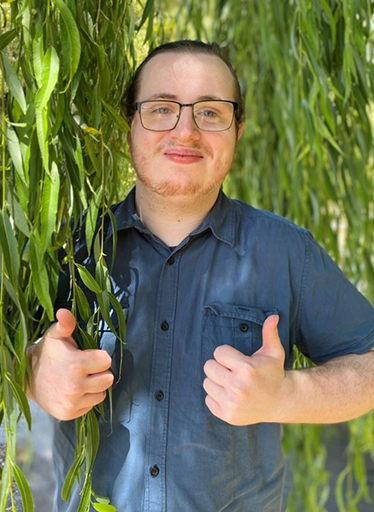
Deciding on a career path in high school is a serious challenge for any student. It’s exactly the same for students who may have a disability – why wouldn’t it be? Perhaps you have no idea what you’d like to do after you leave school. Or you might be having doubts about yourself and how your disability will affect your employment, and that’s ok. Just remember, the sooner you start thinking about your career options, and the pathways that can help you get there, the better.
The good news is the Australian workplace is more inclusive than ever. There are thousands of young adults with a recognised disability who are carving out exciting and rewarding careers for themselves. What might be different for you are the pathways to find the career that’s perfect for your circumstances.

So what is a disability anyway?
It’s a great question. Australians like Nick Vujicic, Carly Findlay, Kurt Fearnley and Dylan Alcott are challenging traditional ideas and attitudes around disability. They’ll tell you their disability isn’t what makes them exceptional, and like most people, they have all faced obstacles to reach their full potential.
The definition of ‘disability’ in the Disability Discrimination Act is broad. It includes:
- Physical, including physical disfigurement
- Intellectual
- Psychiatric or mental ill-health
- Sensory such as sight, sound, touch, taste, smell
- Neurological, as in the nervous system
- Learning disabilities including things like dyslexia, dysgraphia and ADHD
It also includes a range of health conditions. This refers to disease-causing organisms in the body such as Cancer, Cystic Fibrosis, Diabetes, plus many more. The Act also refers to disabilities that people have now. Or had in the past. Or may have in the future. Or are believed to have.
For Teachers – DECYP Students with Disability Hub
The Students with Disability Hub (the hub) helps you support our students with disability, their families, and the community. All the resources you’ll find on this hub are evidence-based and best practice.
You can use these resources individually. However, we recommend you build the use of the hub into the day-to-day operation of your school. For example:
- playing videos resources at professional learning staff meetings; and
- using other resources during the annual Performance and Development Plan (PDP) cycle.
Dive in to the topics on the website to find out more.

Where are you in your career pathway?
Understanding what a career is can be quite tricky. The good news is that there are plenty of resources out there to support you. Want more good news? You’re already on the best resource for Tasmanian students – Careerify. Check out this article to learn about what a career is.
Resources are essential in providing personalised guidance. They help students explore different career paths, and support young people in making informed decisions about their future. If you’re still unsure, talk with your school’s Career Advisor. They play a crucial role in assisting students during transitions and goal-setting.
Take a moment to learn about the services and resources that can help you get to where you want to go.
School Career Advisors
If you’re not sure where to start, don’t worry, a Career Advisor can help you get on the right track. They can help you understand what your interests and skills are, and the things you’re passionate about. Knowing this stuff can provide clues on what to look for in a job, a course or extra-curricular activity you’re more likely to enjoy.
myfuture
myfuture is Australia’s national career information and career exploration website. You’ll find insights on Career Planning for Students on the Autism Spectrum
Everyone can Work
Everyone can Work is a fabulous resource for people with an intellectual disability who are starting to think about work. It includes information, real-life stories, videos, resources, workshops and more.
MyWAY Employability
MyWAY Employability was co-designed by young people with Autism. There are articles on topics such as transitioning from school to further education and training. Further education and training options, work experience, internships, volunteering, life skills and more.
Headspace Work and Study Support
Headspace provides work and study guidance to young people with mental ill-health. Services include: support with work and study, face-to-face in a Headspace centre or one-one-one online, work and study support, and more.
CF Strong
CF Strong has all sorts of information for people living with Cystic Fibrosis (CF). You’ll find personal stories, articles, podcasts, videos and more. Topics include: planning your career while living with CF; how Uni and TAFE can support the needs of people with CF; alternative pathways for Years 11 and 12; finding a career that suits you, and more.
Canteen Education and Career Service
Canteen offers education and career support to young people diagnosed with cancer. This service enables young people to stay connected with study and work during and after cancer treatment. Young people can meet with a Career Consultant face to face, over the phone, or in a video conference call.

Which further education and training is right for you
While challenges exist, the benefits of further education after year 12 are clear. Many further education and training courses can be completed online or part-time. You can search for TAFE, University or private college courses by study mode. See the study mode filter in The Good Universities Guide.
In fact, nothing is ever far away, which is part of the attraction of Tasmania. Our state is dotted with fascinating towns, sites and scenery.
TasTAFE
You’d be amazed at the courses you can study at TasTAFE. Importantly, TasTAFE offers many fee-free courses. TasTAFE Disability Liaison Officers support students living with disability or a health condition. Information about disability support at TasTAFE is available here.
University of Tasmania
Are you considering going onto Higher Education after year 12? Start exploring courses you can study at the University of Tasmania. Disability support information is available on the Accessibility page.
Australian Maritime College
The Australian Maritime College (AMC) is a specialist Institute of the Department of Tasmania. Explore careers in Maritime Engineering and Hydrodynamics, Ocean Seafaring, Global Logistics and Maritime Management – plus heaps more! Full-time and part-time study options are also available. There are alternative entry pathways options available for students wanting to study the the Bachelor of Maritime Engineering Studies.
Apprenticeships and Traineeships
Apprenticeships and traineeships are both ways of earning an income while learning. It may take 3-4 years to complete an apprenticeship and become a qualified tradesperson. A traineeship may take 12-24 months to complete.
The apprentice or trainee is guided by a qualified tradesperson or skilled worker. The apprentice or trainee learns how to perform the tasks on the job. They complete nationally recognised training to become qualified.
If you want to become an apprentice, Apprentice Connect Australia Providers are the first point of contact to get started. They connect apprentices and trainees with employers, and support you throughout your apprenticeship. Plus, there is extra support available for apprentices/trainees with disability or a health condition.
TasTAFE provides training for many apprentices and trainees. If you have a disability and require assistance or assistive technology to support your training or participation in an Information Session, visit TasTAFE disability support services.
Earn while you learn with an Australian School-based Apprenticeship (ASbA)
An Australian School based Apprenticeship is an apprenticeship or traineeship that you do while still at school. So if you’re in Year 10, 11 or 12 you could combine school, employment and training in an industry of your choice. And guess what? ASbAs are available in over 500 occupations. This means there’s every chance you’ll find one that’s a great fit with your interests.
Other resources
Successfully entering post-secondary education takes planning, preparation and careful consideration, for all students. For students with disability or health conditions who might be concerned about how their disability may impact their studies, this is also crucially important.
The Australian Disability Clearinghouse on Education and Training has helpful information on further education or training after you leave school.

Employment services
More and more employment opportunities are opening up for people living with disability – and it’s only going to get bigger. This includes the creation of specialist, government-funded organisations who can help you to develop your own career pathway while at school. Pretty awesome, huh?
National Disability Insurance Scheme
If you’re an NDIS participant you may be eligible for the School Leavers Employment Support (SLES). SLES is available from the time you are in your final year of school. This provides you with two years of support to develop the skills and confidence to transition from school to employment. Finding, Keeping and Changing Jobs is a resource for NDIS participants who want to prepare for work and get a job.
Disability Employment Services (DES)
Disability Employment Services support people with disability or a health condition to find, keep or change a job. DES providers can help people living with disability or a health condition to prepare for work. You can train for specific job skills, and prepare for job interviews. DES providers continue to support you while you are working. You can locate your local DES provider on the Job Access website.
Job Access
Job Access is a national hub of resources and information that can drive disability employment. Job Access has information about support for people with disability. This includes financial support. Support for training and development. Finding and changing jobs. Workplace and adjustments. The rights and responsibilities of people with disability. Plus, videos of stories about people living with disability and their employment. The Job Access YouTube channel showcases people living with disability and the jobs they are doing.
IncludeAbility
IncludeAbility is about creating meaningful employment opportunities for Australians with disability. Resources for people with disability or a health condition include: applying for a job, résumés and cover letters and job interview preparation. Discovering when you might or might not need to disclose your disability. How to identify inclusive employers. Plus the IncludeAbility Employer Network. Membership of this network is by invitation from the Disability Discrimination Commissioner.
Overcoming adversity – Michael’s Story

Check out the amazing story of Michael Shaw in our latest Careerify interview!
Michael opens up about his challenges with school and social interactions and how he overcame them. He shares a pivotal moment in college when a simple compliment led to lasting friendships, highlighting the importance of taking small steps towards social connections. Michael also discusses his experience at the Hamlet Café, where he received training and support that helped him build essential skills and confidence.
Michael’s story shows that with the right support and determination, you can overcome challenges and achieve your goals. It’s a great reminder that progress is possible, no matter what obstacles you face.
Read Michael’s full story here and get inspired to take your own steps towards success!
Push your abilities and interests to the forefront
There are heaps of opportunities available for students with a disability to pursue their chosen career – so why not grab one? Or, if that doesn’t work out, then try another. The good news is there are thousands of people with a disability who are carving out a remarkable and meaningful career for themselves in all sorts of industries. The better news is that you can be the next. So take a moment to reflect on this article – and don’t forget to explore the useful links! For more information, speak with a Career Advisor or teacher at your school.

